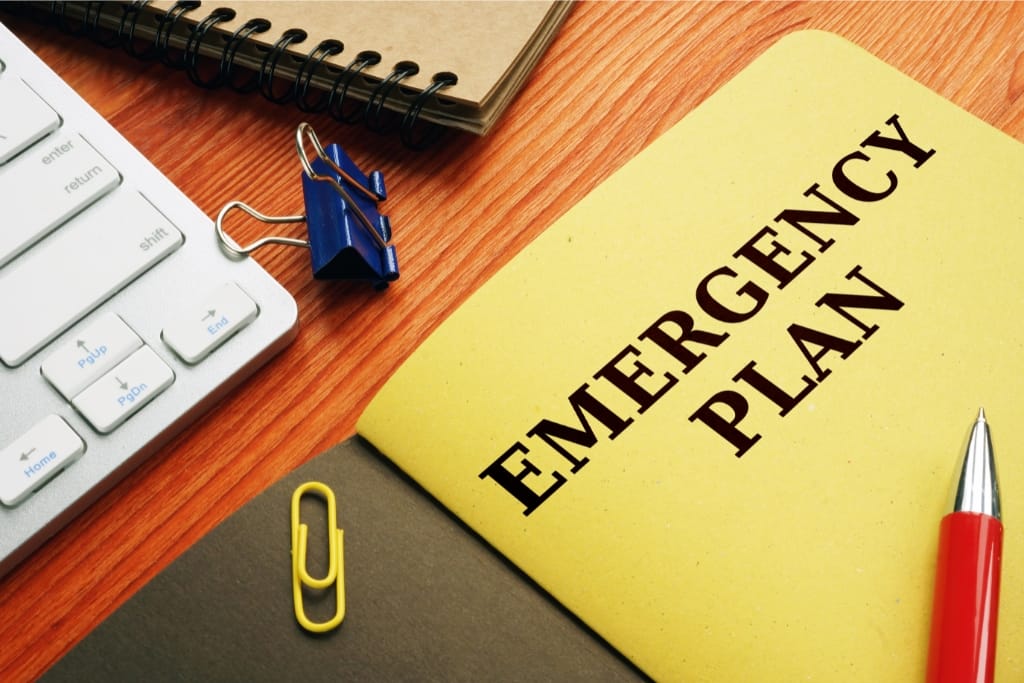Navigating the complexities of urban life can sometimes present unexpected challenges and emergencies.
Whether confronted with a sudden power outage, severe weather conditions, or public transport disruptions, being prepared is essential to ensuring personal safety and peace of mind.
This article offers practical tips and strategies to equip yourself with the skills and resources necessary to handle urban emergencies effectively.
Prepare yourself now so that you can confidently handle any situation that may arise.
Read on to uncover the essential knowledge and tools required for staying safe and prepared in your city.
1)) Create An Emergency Plan
An emergency plan serves as a crucial blueprint for managing unexpected situations in urban settings.
Start by identifying potential risks in your environment, such as flooding, earthquakes, or industrial accidents.
Assign clear roles and responsibilities to each family member or household participant, ensuring everyone knows their tasks during an emergency.
Designate safe meeting locations, both within and outside your neighborhood, to gather in case of evacuation.
Include contact information for emergency services, family members, and neighbors in the plan.
Regularly review and practice your plan with all involved to ensure familiarity and prompt execution.
By creating and maintaining a comprehensive emergency plan, you lay the groundwork for effective responses that can minimize stress and protect lives during unpredictable urban events.
Incorporating physical emergency preparedness checklists and emergency contact forms into your emergency plan can significantly enhance your readiness for urban emergencies.
Checklists serve as tangible reminders of the essential supplies and actions needed during a crisis, ensuring nothing crucial is overlooked in the heat of the moment.
By including items such as first-aid kits, water, non-perishable food, and flashlight batteries, these checklists help streamline your preparation efforts.
Meanwhile, emergency contact forms provide quick access to vital information, such as phone numbers for emergency services, family members, and medical professionals, enabling swift communication when it matters most.
Having these resources at hand reinforces your emergency plan's effectiveness, paving the way for a proactive and organized response.
To ensure your safety and preparedness, take action now by creating detailed checklists and contact forms tailored for your family's needs, and integrate them into your emergency plan.
2)) Assemble An Urban Emergency Kit
An essential aspect of urban preparedness is assembling a well-stocked emergency kit.
This kit should contain vital items that could support you and your family for at least 72 hours during an urban emergency.
Start with basic provisions like water, non-perishable food, and a manual can opener.
Include medical supplies such as a first-aid kit, prescription medications, and essential hygiene products.
Equip your kit with practical tools like a flashlight, batteries, a multi-tool, and a whistle.
Don’t forget essential documents, such as identification and insurance papers, stored in waterproof containers.
Carefully consider the specific needs of all family members, including pets, and update the kit periodically to ensure everything remains usable.
By diligently assembling and maintaining a complete urban emergency kit, you ensure that essential resources are readily available when they are most needed.
Pro-Tip: Consider investing in a pre-made 72 Hour Survival Kit. These kits are expertly curated to include everything you might need for the initial critical hours of an emergency, saving you the hassle of gathering supplies on your own.
With essentials like food, water, medical equipment, and safety tools all in one package, you can be assured of immediate readiness.
Take action today by exploring reputable survival kit options to bolster your emergency preparedness strategy.
3)) Stay Informed With Reliable News Sources
Staying informed with reliable news sources is integral to urban emergency preparedness.
Access to accurate and timely information allows you to make informed decisions and take appropriate actions during a crisis.
Establish a list of trusted media outlets and government agencies that report on local and national events, and subscribe to their alerts or newsletters.
Utilize various platforms, such as radios, walkie-talkies, smartphones, and social media, to ensure you receive updates even if one platform is disrupted.
Make it a habit to verify information with multiple reputable sources to protect yourself from misinformation and rumors that can lead to unnecessary panic.
Keeping abreast of developments enables you to adjust your emergency plans and actions accordingly, ensuring your safety and that of your loved ones as events unfold.
4)) Secure Your Home And Important Belongings
Safeguarding your home and important belongings is a vital step in urban emergency preparedness.
Begin by reinforcing your home's structural integrity to withstand potential threats like severe weather or break-ins.
Install sturdy locks on doors and windows, and consider using deadbolts or security bars for added protection.
For essential documents and valuable items, secure them in a fireproof and waterproof safe.
Familiarize yourself with shutting off utilities such as gas, electricity, and water in case of leaks or other hazards.
Conduct regular inspections and maintenance of your home to identify and address any vulnerabilities.
By proactively securing your home and valuables, you create a safer living environment and reduce the risk of loss during urban emergencies.
5)) Learn Basic First Aid And CPR
Possessing knowledge of basic first aid and CPR can be lifesaving during urban emergencies, where immediate medical help might not be readily available.
Begin by enrolling in a certified first aid and CPR course offered by reputable organizations like the Red Cross or the American Heart Association.
These courses equip you with essential skills such as performing CPR, controlling bleeding, treating burns, and managing fractures or sprains.
Regular practice and refreshers are crucial to maintaining proficiency and ensuring swift response when required.
Encourage family members and neighbors to participate in these trainings, fostering a supportive and prepared community.
By learning basic first aid and CPR, you empower yourself and others to provide critical assistance in emergencies, potentially saving lives and reducing the severity of injuries while awaiting professional care.
6)) Build A Support Network With Neighbors
Developing a strong support network with neighbors is an invaluable component of urban emergency preparedness.
Engaging with those living nearby increases community awareness and fosters a sense of unity and collective responsibility.
Start by introducing yourself to neighbors and exchanging contact information to facilitate open communication.
Organize regular neighborhood meetings to discuss emergency plans and share resources such as tools, food, and skills.
Establish roles within the network to enhance coordination during emergencies, designating individuals to handle specific tasks or responsibilities.
This collaboration can ensure a more organized and effective response, minimizing confusion and maximizing resources in critical moments.
By building a reliable support network, you establish trust and cooperation among neighbors, creating a resilient community ready to navigate urban challenges together.
7)) Know Evacuation Routes
Understanding and familiarizing yourself with evacuation routes is crucial for effective urban emergency preparedness.
Start by researching the official evacuation routes designated by local authorities and ensure they are well-marked and easily accessible from your location.
Regularly review and update your evacuation plans, taking into account different scenarios like natural disasters, fires, or other emergencies.
Practice these routes with your family to ensure everyone is familiar with the process and knows what to do when an evacuation becomes necessary.
Keep a map of the area handy, both in physical and digital form, which displays alternative routes in case the main path is blocked or unsafe.
By knowing and practicing evacuation routes, you significantly increase your ability to leave high-risk areas quickly and safely, reducing potential risks for you and your loved ones.
8)) Have A Food And Water Supply
Maintaining a sufficient food and water supply is essential for urban emergency preparedness, ensuring that you and your family can endure disruptions in utilities or access to stores.
Begin by creating a detailed inventory of non-perishable food items, such as canned goods, dried fruits, nuts, and packaged meals that can last for extended periods.
Store at least a three-day supply of water, allocating one gallon per person per day for drinking and sanitation purposes.
Regularly check expiration dates and rotate your stock to ensure freshness. Consider any special dietary needs by including appropriate food options for infants, elderly family members, or pets.
By having a well-planned food and water supply, you enhance your capacity to remain self-sufficient and comfortable during emergencies, alleviating stress and supporting resilience in challenging times.
Pro-Tip: Packing water purification tablets and portable water filters in your 72-Hour Survival Kit ensures access to safe drinking water when usual sources are compromised.
These tools are lightweight, making them easy to carry, and they provide a reliable method to purify contaminated water by eliminating bacteria and viruses.
Using purification tablets is straightforward and effective, as you only need to dissolve them in water and wait for the recommended time to ensure safety.
Portable filters offer immediate filtration, making them ideal during emergencies to produce clean water on demand.
By including both in your kit, you increase your options and flexibility in maintaining hydration and hygiene during critical times.
9)) Prepare A Financial Emergency Fund
Establishing a financial emergency fund is a critical aspect of urban emergency preparedness, providing a necessary buffer during unforeseen events or financial hardships.
Begin by assessing your monthly expenses and aim to save three to six months' worth of living costs in an accessible account.
Prioritize contributions to this fund by setting up automatic transfers from your paycheck or cutting unnecessary expenses.
Having a dedicated emergency fund enables you to manage unexpected expenses such as medical emergencies, temporary unemployment, or urgent repairs without resorting to debt.
Keeping some cash on hand ensures you have access to funds if digital payment systems are down. By preparing a financial emergency fund, you secure financial stability and peace of mind, better equipping yourself to handle emergencies without added financial stress.
10)) Establish Communication Strategies
Establishing effective communication strategies is a vital component of urban emergency preparedness, ensuring that you can connect with family, friends, and authorities during a crisis.
Start by developing a communication plan that includes a list of key contacts, including local emergency services, family members, and neighbors, alongside their phone numbers and email addresses.
Utilize a range of communication tools such as mobile phones, social media platforms, and two-way radios to stay informed and relay information quickly.
Consider creating a group messaging system for your neighborhood or family to disseminate urgent updates and coordinate efforts.
Practicing emergency communication drills with your community can help identify potential gaps and improve efficiency.
By establishing robust communication strategies, you create a reliable framework for staying informed and connected, which is essential for effective coordination and response during emergencies.
Conclusion
Urban emergency preparedness is about taking proactive steps to safeguard yourself, your loved ones, and your community in the face of unforeseen challenges.
By knowing evacuation routes, maintaining a well-stocked food and water supply, and preparing a financial emergency fund, you lay a strong foundation for resilience.
Coupled with establishing effective communication strategies, these measures ensure you're equipped to handle emergencies efficiently and confidently.
Building these capabilities not only mitigates risks but also fosters a sense of security and unity within your community, reinforcing the understanding that preparedness is a shared responsibility and a crucial element of urban living.
Download Our Free E-book!







